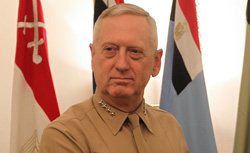Gen. James Mattis, USMC
The general who is fighting a constant battle to keep the military innovating.
When speaking to rising officers, Marine Gen. James Mattis likes to tell the story of the British Navy. At the turn of the 19th century, it had no rival in the world, but 100 years later it had grown complacent in dominance. Officers amassed rules, ribbons, and rituals that had little to do with the changing nature of war. "They no longer had captains of wars," he tells them, "but captains of ships."
As commander of the U.S. Central Command, Mattis oversees the wars in Afghanistan and Iraq, but his career mission has been against complacency. In modern warfare the reliance on better technology and superior firepower deadens the talent for innovation, he argues. This blinds some officers to emerging threats and slows their ability to react to them. The U.S. military, he argues "must avoid becoming dominant and irrelevant."
A student of history and the beneficiary of decades of Marine teachings, Mattis also saw the dangers of failing to adapt firsthand. He commanded the First Marine Division that led the invasion into Iraq in 2003. Two months later he was called back to Iraq to fight a far different enemy than the one he had left: An insurgency had grown largely unchecked, and some military leaders had failed to spot the change. Mattis' innovative approach to adapting to insurgent warfare where soldiers and Marines must "apply violence and chivalry often changing block by block" helped inform the doctrine contained in the Counterinsurgency Manual that he co-developed with Gen. David Petraeus, who will take over the CIA in September.
The higher your rank, the harder it is to get unfiltered information. So to keep his rank from getting in the way of seeing the battle and his men clearly, Mattis instituted reforms big and small. He uses the Marines term to "command and feedback" not the traditional "command and control" to emphasize communications. He tasked "eyes officers" to go through the ranks and report back to him those problems and concerns officers might be too tentative to report up the formal chain of command.
If you are always on the hunt for complacency, argues Mattis, you will reward risk-takers, and people who thrive in uncertainty. "Take the mavericks in your service," he tells new officers, "the ones that wear rumpled uniforms and look like a bag of mud but whose ideas are so offsetting that they actually upset the people in the bureaucracy. One of your primary jobs is to take the risk and protect these people, because if they are not nurtured in your service, the enemy will bring their contrary ideas to you."
He could easily be describing himself. As a colonel in the Gulf War, he pestered his operations officer so often with new ideas, C.H.A.O.S. came to stand for: "Colonel Has Another Outstanding Solution."
Check out the rest of our government Top Right:
David Bossie, chairman and president, Citizens United
Michael Crow, president, Arizona State University
Jonathan Gruber, professor of economics, MIT
Janette Sadik-Khan, New York City transportation commissioner


